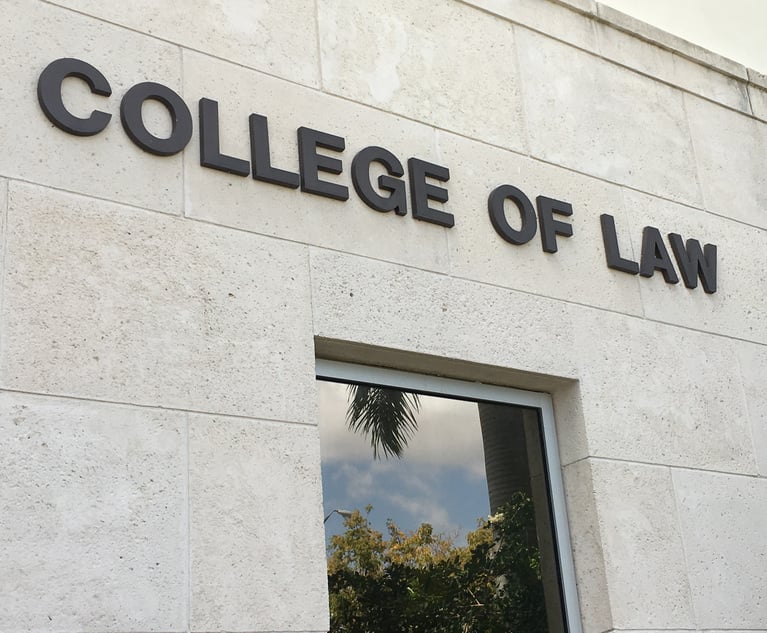You Failed the Bar Exam. Now What?
With bar pass rates in the dumps nationwide, two academic support deans offer their advice to those who failed on how to absorb the bad news and pass on the next try.
October 24, 2018 at 02:16 PM
6 minute read

Bar exam results are coming in across the country, and they aren't pretty.
The national average score on the Multistate Bar Exam for July sank to a 34-year low. New York's pass rate dropped five percentage points to a dismal 63 percent. The pass rate in Pennsylvania ticked down from 81 percent to 79 percent. Florida didn't fare any better, seeing its pass rate drop to 67 percent from 71 percent the previous year. All of this means that a lot of law graduates are facing the prospect of retaking the bar.
We reached out to Allie Robbins, assistant dean for academic affairs at the City University of New York School of Law, and Amy Jarmon, assistant dean for academic success programs at Texas Tech University School of Law, for their advice on how to digest the bad news and plan for taking the exam again. Here's what they said.
1. Process the News
Finding out you failed the bar exam can be a shock to the system and a major blow to one's self-esteem. Take a few days to grieve the failure, but keep it in perspective. “You're going to be upset, you're going to be angry,” Robbins said. “It's OK to feel that for a couple of days. But failing the bar doesn't mean anything about how you're going to be as an attorney—that you're still going to be a fabulous attorney. You need to move past it after a few days and turn it into action.” Those who have failed the bar often feel embarrassed that their classmates will find out, or guilty that they have let down their families, Jarmon said. “Part of it is getting beyond the emotions of it, grieving the fact that you didn't pass, and then moving on and reaching out,” she said.
2. Talk to Your Employer
Studying for the bar exam a second time around is especially tricky for law graduates who are already working. Many can't afford to step away from their jobs in order to focus solely on studying, so it's important to discuss the situation with your work supervisor and develop a plan for taking time off or reducing your work hours as the exam approaches. Robbins suggests taking time off work in the days right before the exam. And retakers should aim to study for two hours a day and all day on weekends.
3. Reach Out to Your Law School
Just because you've graduated doesn't mean you can't make use of your law school's bar exam resources. In fact, law schools want you to stay in touch and continue to use their academic support and bar exam help. Jarmon said Texas Tech's bar support staff helps retakers figure out what went wrong on the exam, develop a game plan for studying again, and keeps them accountable for following that plan. They also offer much-needed encouragement. “Here at CUNY Law, we have a mentor program that we run for every bar exam,” Robbins said. “We allow retakers to be part of it, so they are paired up with one of our faculty or alums. They get to do essays together and [Multistate Performance Tests] together and talk about the process. I know academic and bar support folks around the country do that.”
4. Pinpoint What Went Wrong
Did anxiety or panic attacks derail you on the bar? Did you not study enough? Identifying the root causes of your failure will help you develop a more effective plan of attack for retaking the bar exam, Jarmon said. If anxiety was a factor, seeking out counseling may be the most effective course of action. If you simply didn't put in enough study time or complete enough of your bar prep course, committing to more study could make the difference, she said. Robbins suggests that bar failers get their written work back, if they're in jurisdictions that allow it. Comparing their essays to the model answers is a great way to identify problems. “It can help you pinpoint places you need to improve, whether it's structural, issue spotting, or rule memorization,” she said.
5. Develop a Study Plan, and Stick to It
Jarmon suggests test takers carve out specific times to study, and don't just count on grabbing study time here and there. Most bar prep courses will allow bar failers free access to study materials if they already paid for the course. But Robbins counsels students not to rewatch all the lectures. Instead, she and Jarmon emphasize taking as many practice exams as possible. “The more practice questions you do, the more likely you are to become a good test taker for the format,” Jarmon said. “You also find out what areas you need some extra study in.” Robbins tells students to ease back into studying with subjects they are already comfortable with, rather than jumping right in on those that they struggled with on the first bar.
6. Fight the Urge to Isolate Yourself
“I've had students who isolate themselves and don't want to talk to anyone about it,” Robbins said. “But they usually have worse outcomes than those who engage. Bar exam study is isolating enough, and it's better to reach out for support as you're doing this again.” Every year CUNY Law holds a bar retaker lunch or dinner, bringing back graduates who passed the exam on their second try to speak with those who recently failed the exam. The event helps attendees to put their failure in perspective and understand that the test is not an indication of their potential as attorneys.
7. Believe in Yourself
It's easy to become overwhelmed with self-doubt after failing the bar exam, but those negative feelings can derail your efforts to pass the second time, according to Jarmon. “A lot of time, failing the first time becomes a psychological barrier that folks have trouble getting past,” she said. “A lot of passing the bar—in addition to putting in the hours and being effective and efficient in how you study—is just believing in yourself. It's easy to feel like, 'Maybe I'm too dumb to do this.' They have to put the failure behind them and say, 'here are things I can do differently to help me pass the next time.'”
This content has been archived. It is available through our partners, LexisNexis® and Bloomberg Law.
To view this content, please continue to their sites.
Not a Lexis Subscriber?
Subscribe Now
Not a Bloomberg Law Subscriber?
Subscribe Now
NOT FOR REPRINT
© 2025 ALM Global, LLC, All Rights Reserved. Request academic re-use from www.copyright.com. All other uses, submit a request to [email protected]. For more information visit Asset & Logo Licensing.
You Might Like
View All
State Appellate Court Settles Fee Battle Between Former Co-Counsel in Patent Litigation
5 minute read

Justified Termination Does Not Bar Associate Attorney From Unemployment Benefits, State Appellate Court Rules
5 minute read
Florida Law Schools Are Seeing a Bump in Applications for 2025, After Recent Declines at Flagship Schools
3 minute readTrending Stories
- 1States Accuse Trump of Thwarting Court's Funding Restoration Order
- 2Microsoft Becomes Latest Tech Company to Face Claims of Stealing Marketing Commissions From Influencers
- 3Coral Gables Attorney Busted for Stalking Lawyer
- 4Trump's DOJ Delays Releasing Jan. 6 FBI Agents List Under Consent Order
- 5Securities Report Says That 2024 Settlements Passed a Total of $5.2B
Who Got The Work
J. Brugh Lower of Gibbons has entered an appearance for industrial equipment supplier Devco Corporation in a pending trademark infringement lawsuit. The suit, accusing the defendant of selling knock-off Graco products, was filed Dec. 18 in New Jersey District Court by Rivkin Radler on behalf of Graco Inc. and Graco Minnesota. The case, assigned to U.S. District Judge Zahid N. Quraishi, is 3:24-cv-11294, Graco Inc. et al v. Devco Corporation.
Who Got The Work
Rebecca Maller-Stein and Kent A. Yalowitz of Arnold & Porter Kaye Scholer have entered their appearances for Hanaco Venture Capital and its executives, Lior Prosor and David Frankel, in a pending securities lawsuit. The action, filed on Dec. 24 in New York Southern District Court by Zell, Aron & Co. on behalf of Goldeneye Advisors, accuses the defendants of negligently and fraudulently managing the plaintiff's $1 million investment. The case, assigned to U.S. District Judge Vernon S. Broderick, is 1:24-cv-09918, Goldeneye Advisors, LLC v. Hanaco Venture Capital, Ltd. et al.
Who Got The Work
Attorneys from A&O Shearman has stepped in as defense counsel for Toronto-Dominion Bank and other defendants in a pending securities class action. The suit, filed Dec. 11 in New York Southern District Court by Bleichmar Fonti & Auld, accuses the defendants of concealing the bank's 'pervasive' deficiencies in regards to its compliance with the Bank Secrecy Act and the quality of its anti-money laundering controls. The case, assigned to U.S. District Judge Arun Subramanian, is 1:24-cv-09445, Gonzalez v. The Toronto-Dominion Bank et al.
Who Got The Work
Crown Castle International, a Pennsylvania company providing shared communications infrastructure, has turned to Luke D. Wolf of Gordon Rees Scully Mansukhani to fend off a pending breach-of-contract lawsuit. The court action, filed Nov. 25 in Michigan Eastern District Court by Hooper Hathaway PC on behalf of The Town Residences LLC, accuses Crown Castle of failing to transfer approximately $30,000 in utility payments from T-Mobile in breach of a roof-top lease and assignment agreement. The case, assigned to U.S. District Judge Susan K. Declercq, is 2:24-cv-13131, The Town Residences LLC v. T-Mobile US, Inc. et al.
Who Got The Work
Wilfred P. Coronato and Daniel M. Schwartz of McCarter & English have stepped in as defense counsel to Electrolux Home Products Inc. in a pending product liability lawsuit. The court action, filed Nov. 26 in New York Eastern District Court by Poulos Lopiccolo PC and Nagel Rice LLP on behalf of David Stern, alleges that the defendant's refrigerators’ drawers and shelving repeatedly break and fall apart within months after purchase. The case, assigned to U.S. District Judge Joan M. Azrack, is 2:24-cv-08204, Stern v. Electrolux Home Products, Inc.
Featured Firms
Law Offices of Gary Martin Hays & Associates, P.C.
(470) 294-1674
Law Offices of Mark E. Salomone
(857) 444-6468
Smith & Hassler
(713) 739-1250








